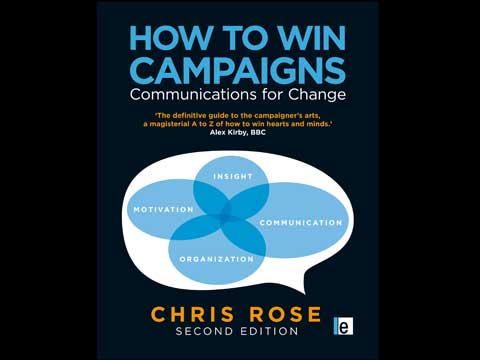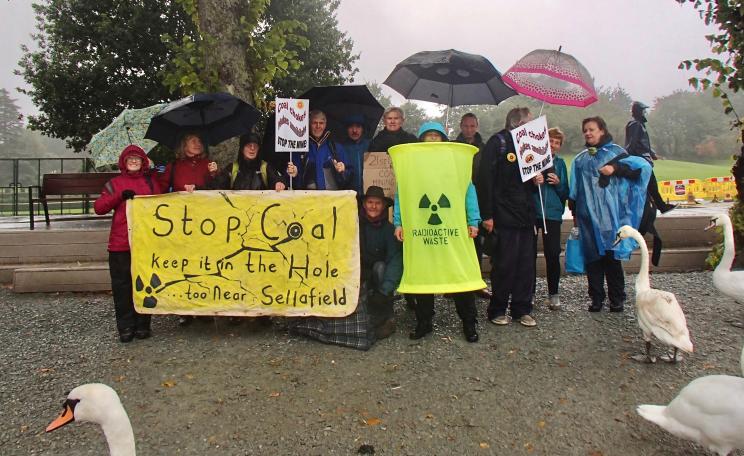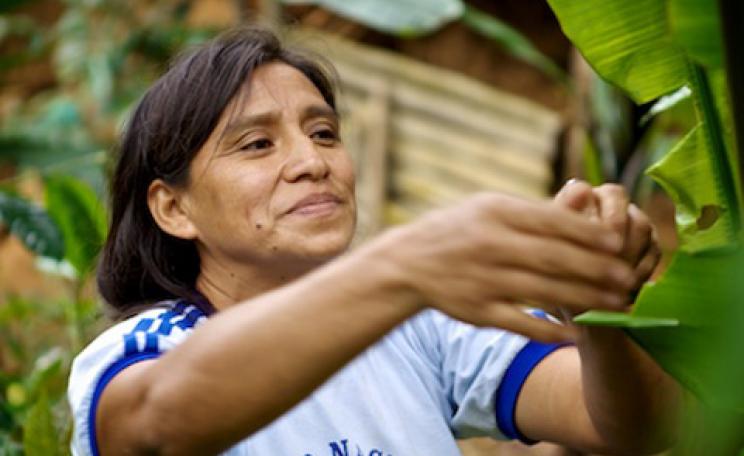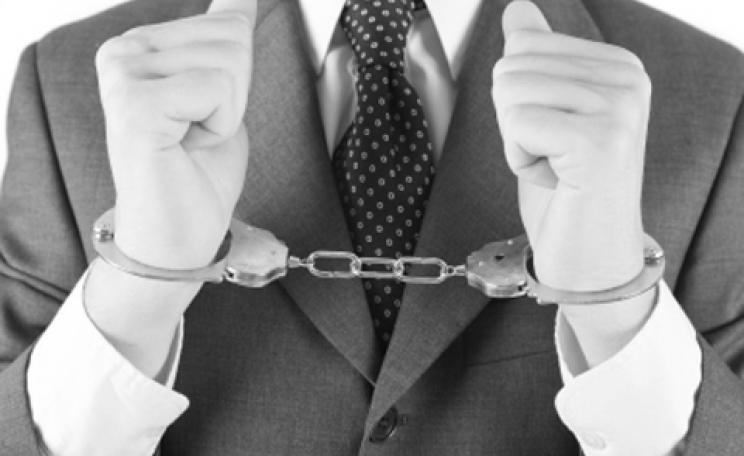‘Head of activism' is a great title. What does it mean?
Yes it certainly gets a few comments! It's a job I'm really lucky to have. Friends of the Earth puts grassroots campaigning and the involvement of people at the heart of what we are about, and aims to do it as well as possible.
We have over 200 local groups active in communities across the country that make up a powerful grassroots environmental network. They campaign, raise awareness and engage the public on issues and projects that they are passionate about. This can be everything from fighting plans for a local supermarket or getting a farmers market off the ground to getting involved in and running our big national campaigns in their towns. Friends of the Earth is a way of linking the local to the global and tackling both together.
We're also exploring how people can get active on environmental issues and our campaigns in other ways too. The web offers huge potential as a tool to bring people together online and offline and get them more involved in shaping campaigns and taking action quickly on the issues that matter. This can have real impact if we do it right.
Basically, my job is to try to help make sure all of that happens as well as possible.
What has been your most successful campaign to date?
Friends of the Earth has got a seriously proud history of campaigning with successes at all levels.
One of our most recent and biggest wins was achieving the world's first climate change law through our Big Ask campaign. Friends of the Earth came up with the idea, led the campaign and got hundreds of thousands of people involved in supporting it in all sorts of ways, by signing our petition, recording a video message for our virtual online march or visiting their MP. Everyone involved should rightly be very proud of that one.
That said, what gets my pulse racing is hearing about the local victories our groups achieve, often against the odds. Sometimes it's stopping something damaging like plans for an incinerator, and sometimes it's creating new positive environmental change in their area, like getting the council to set a local climate change target. Our proudest achievement as Friends of the Earth is the mass of change we trigger, together with our supporters and activists, across the country.
What has been your least successful campaign to date?
Well, you win some you lose some. You learn from your losses. Most campaigns have impact, lessons to learn and positive outcomes even when you don't win what you wanted to win. That's an important thing to remember. An example's the Newbury Bypass campaign. Newbury Friends of the Earth had been working on the early stages of that for a decade before it really went big and when it did, we stuck with it. We worked on the political strategy behind it, helped support the loose alliance of groups and individuals, organized massive events, provided legal and front line support and so on. It was a hard campaign and ultimately we didn't win - the road was built. But the thing about campaigning is that you sometimes lose, and sometimes you have to lose the battles to win bigger things. A major consequence of that campaign was that it helped halt the Government's road building programme for years to come.
What gets you out of bed when you're at your lowest?
Usually my stepchildren! And the UK's natural environment really stirs me inside so I'll often head to my garden or the countryside to pick myself up.
In a campaigning sense what gets me out of bed is the vision that gets us all into this in the first place. All of these campaigns we run and things we try to stop or start have to add up to something. To me that's got to be a world that's fair, where we live sustainably, where the environment is healthy, where the places we live have vibrant and active communities where people are empowered to make their voices heard. I'm not willing to accept it's a pipedream. I don't think it is. So why not get out of bed and try to get us a step closer?
Corporations: work with them or against them?
I wish things were that simple, but they never are. Sometimes we have targeted corporations like Tesco, Shell and Monsanto directly to change their ways, other times we've highlighted terrible corporate behaviour to strengthen the case for regulation or change. However, there some also corporations out there that are willing to help champion change or support important steps and sometimes they can be powerful and important allies.
What is the best way to motivate people?
Ultimately, it's how you say it. I've seen a lot of people talking. Sometimes I like what I hear, sometimes I don't. But a few times, I get really stirred inside and want to run out and get on with dealing with the problem right there and then. It's partly the content of what they've said, but it's mainly how they've said it. It's the passion and the drive and the fact that the way they've spoken has resonated for me. Different people respond to messages in different ways and ultimately, if you can couple knowing what you are talking about with some sincerity and a message that really resonates for them, not just for you, you can rouse them to act.
What is the best way of reaching politicians?
Go and talk to them! Friends of the Earth is very good at this one. MPs listen to arguments, but more than anything they listen to the mood of the people that vote them in. We lobby face to face, we pile on the pressure through the press, we show them how much the people of their area care. We find ways for them to show their colours in parliament. We help others talk to them, and then we go and talk to them some more. Never be scared just to talk to them direct. And if you aren't too sure, then come and join a Friends of the Earth group and we'll help you have a go at it!
What is the most important thing to avoid when campaigning?
Not knowing what you're talking about. Passion, drive and eloquence are all critical but ultimately you do need to know your facts - and be able to back them up. If we want to deliver change, we have to know what we want that change to look like, how it can be achieved and be able to answer the critics. You lose credibility fast if you don't know your stuff. And another one, for those that run campaigns a lot, is to avoid using tactics you've always used, just because you've always used them. Every campaign should be designed to be won, not just to be run.
Most important thing government could do this year?
Well it could remind itself of a pledge it made to be the greenest government ever. The recession is no reason to turn away from a green future - in fact the kinds of policies we need to see them enacting on climate change would in create a green industrial revolution with the potential for new jobs and industries. If there's one thing they could do this year, it would be to use the Energy Bill they're working on now to create energy policy based on investment in renewable energy and stopping energy waste, and moving us away from nuclear and coal.
Most important thing individuals could do this year?
The events in Japan are terrible and all of our thoughts have to be with the people that have lost loved ones, livelihoods and in some cases, entire communities. They show us yet again that nuclear power is a gamble we don't need to take. A clean and safe future based on renewables and stopping energy waste is possible. Yet the UK Government's support for nuclear is blocking vital funding for it. So one thing the public can do right now is to go to Friends of the Earth's website and sign our petition for a safer energy future. You can always come back and read the rest of this article afterwards!
What makes a good campaigner?
There are all sorts of courses and conferences on becoming an expert at campaigning but really there are just a few basic ingredients. Passion, dogged determination and an unwillingness to give up are a good start. Knowing exactly what you want, and being clear on your facts, are important too. A bit of a thick skin helps sometimes, empathy is essential - and it's much harder, and much less fun, without a sense of humour!
What (other) campaign has caught your attention recently?
UK Uncut are doing some great stuff and mobilising really effectively. I think UK Youth Climate Change Coalition are a really inspiring bunch too, full of great ideas. Obviously I enjoyed watching the government back down over forests - a wise move. It's an exciting time out there - challenging, but exciting and full of opportunities.
Who is your campaign hero (past or present)?
This is going to sound a little cheesy. But what truly inspires me are the real, ordinary people pushing passionately for change in ways we mostly never hear about. That's at the heart of Friends of the Earth. The people that have impacts in their communities, never give up and just seem to be bubbling away with energy, passion and ideas. For that reason, whilst there are lots of other examples, my real campaign hero is my partner Dina, who is a local environmental campaigner in Warrington.
| READ MORE... | |
 |
HOW TO MAKE A DIFFERENCE The Ecologist guide to data activism You don't have to be a web geek to join the growing ranks of activists who have told powerful stories using data visualisation. Christine Ottery outlines how you can use data as a powerful tool to press for change |
 |
HOW TO MAKE A DIFFERENCE How to Win Campaigns Part I: Communication essentials Proven top tips on communicating your issues effectively from one of the UK's most successful campaigners... |
 |
HOW TO MAKE A DIFFERENCE After the spending cuts: our step-by-step guide to greening your local council If you already have a low-impact lifestyle and want to step it up a level, turn your attention to your local council. Here's how to get the authorities in your area to act |
 |
HOW TO MAKE A DIFFERENCE NEW! TAKE ACTION on nuclear power With the Japanese nuclear disaster still unfolding, make your voice heard on Britain's sustainable energy future: say no to nuclear... |
 |
HOW TO MAKE A DIFFERENCE CASE STUDY: from campaign group to Westminster From chasing endangered parrots to hunting for the environmental holy grail with Friends of the Earth, one of Britain's pre-eminent eco campaigners wants to take his quest for a better, greener world to the halls of Westminster. Dixe Wills meets a man on a mission |








